Round One in Colombia
The first round produced two very different candidates.
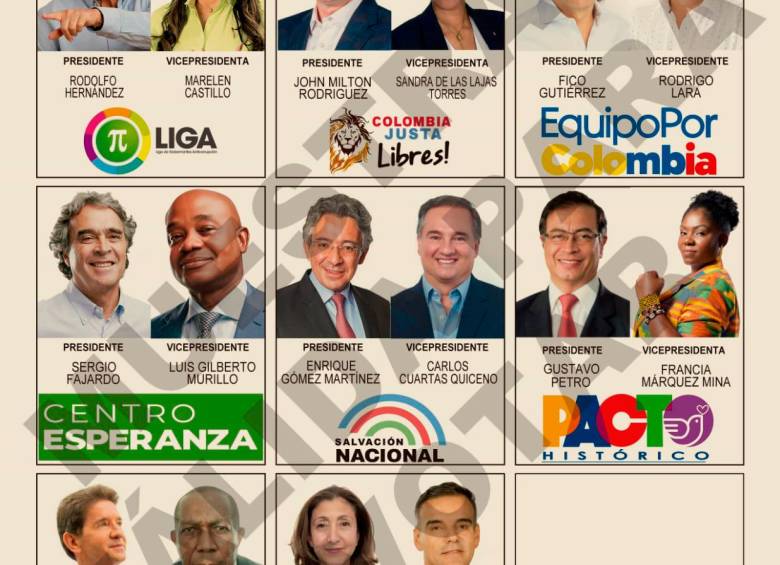
Yesterday (a Sunday on which the country would have been focused almost exclusively on voting) Colombians went to the polls to cast ballots in the first round of the presidential elections. The general structure of Colombia’s national government is similar to that of the US, a bicameral legislature and separately elected chief executive. There are numerous differences, large and small, but a key one for this discussion is that the president is elected by the popular vote (unlike in the United States) and the president must win at least 50% of the vote to win office.
The results were that the front-runner, Gustavo Petro, won first place and the runner-up was Rodolfo Hernández, who has been dubbed “the Donald Trump of Colombia.”
Here’s the breakdown with 99.99% of the vote counted:
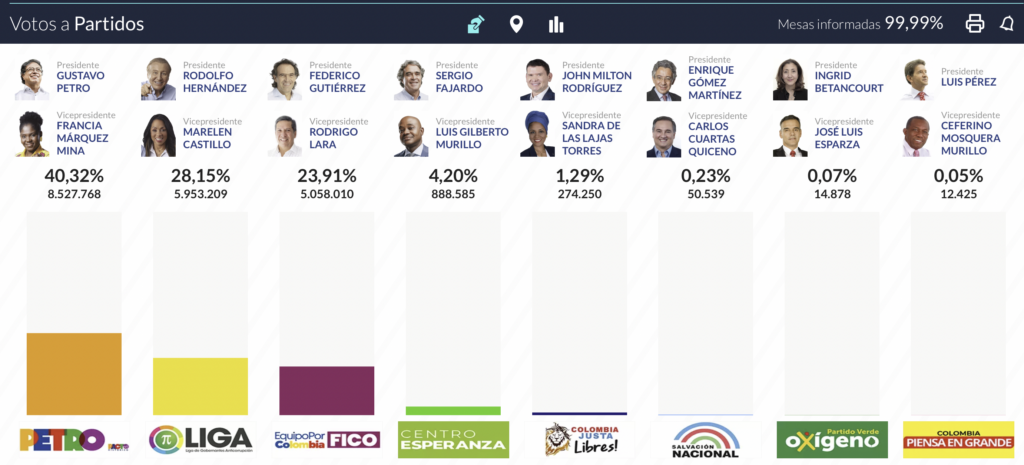
As most press accounts note if Petro were to win he would be the first leftist president that Colombia has ever had, although I would hasten to add that Petro should not be understood as a radical (although his opponents have, and will, continue to paint him as a Colombian Chávez). It is often frequently noted that Petro was part of the Movement of the 19th of April guerrilla organization (M-19). M-19 was a predominantly urban guerrilla movement that arose around electoral fraud in the 1970 presidential election (on, oddly enough, April 19th). M-19 demobilized to participate in the 1991 constitutional convention and transitioned to a political party at that time. Petro moved into politics, being part of the M-19’s first congressional delegation, serving in the Chamber of Representatives. He would later be elected to the Senate (where he currently serves, but also served previously) and was mayor of Bogotá from 2012 to 2015. He has run for the presidency more than once, coming in second in 2018 to the sitting president Iván Duque (losing 54%-42%).
He is a figure truly of the progressive left, as his views on things like the environment would suggest, as well as his criticisms of capitalism. Nonetheless, he is pro-democratic (i.e., not someone I would consider a Chaváz-style risk) and seems focused on governing (he made a number of moves to improve transit when he was mayor). He is not above controversy, as his conflict with contractors over sanitation demonstrated. This led to a recall that was reversed (long story).
If he is elected he will face substantial opposition from within the establishment. As the NYT notes in one of its write-ups:
“I am very worried,” said Elisabeth Ungar, a longtime Colombian political analyst, adding that the country was in the midst of a democratic “regression” unlike anything she’d seen before.
There is widespread distrust in the voting system following a March congressional election in which the registrar, a top election body, failed to include more than a million votes in its initial count, many for Mr. Petro’s coalition.
[…]
Amid the electoral doubts, there is also growing tension between Mr. Petro and the armed forces, escalating concerns that the two are headed for a clash should he win.
That tension hit a high last month, when Mr. Petro accused several generals of taking money from a criminal group, without providing proof. The head of the army, Gen. Eduardo Zapateiro, shot back, calling Mr. Petro the corrupt one, despite a constitutional provision that bars members of the armed forces from political participation.
President Iván Duque, a political opponent of Mr. Petro’s, defended the general, further inflaming tensions.
If Mr. Petro wins, “I don’t think there will be a coup d’état,” said José Luis Esparza, a retired colonel. “But there are going to be many internal conflicts.”
Meanwhile, Hernández is a former mayor of Bucaramanga whose campaign is basically just “anti-corruption.” Also via the NYT:
Mr. Hernández, a former mayor of a midsize city, has based his campaign around one issue — jailing the corrupt — but his position on other issues is less clear.
He has suggested combining ministries to save money and declaring a state of emergency for 90 days to address corruption, leading to fears that he could shut down Congress or suspend mayors.
Some voters said they were attracted to what Mr. Hernández has promised. “I think his entrepreneurial view of things is comparable with Trump,” said Salvador Rizo, 26, a tech consultant who lives in Medellín.
One thing that I think Hernández has in common with Trump in 2016 is that the right-wing of Colombia’s electorate will see him as their only choice, even if he is not a traditional right-wing politician, ideologically speaking. It is concerning if he is already talking about using emergency powers once elected (ironically, that is the move chavista behavior).
One thing is for certain: whoever is elected in June will be a different kind of president for Colombia and will be disruptive.
In looking at the first-round results, Petro is in good position with a base of 40ish%. Hernández has a lot of ground to cover, but it is worth noting that the third-place finisher, Federico Gutiérrez, has pledged support to Hernández. Gutiérrez was the leader of a center-right coalition, but my initial thought is that it will be difficult to deliver that entire block of votes, but it is also true that one can see a majority for the right in the results posted above. The question is going to be how appealing will Hernández’s populism be?
I do expect the run-off to be close. And, as noted, the outcome will be consequential regardless of who wins.

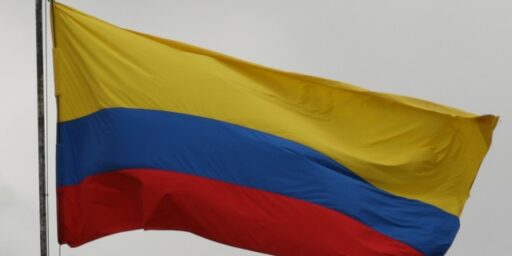
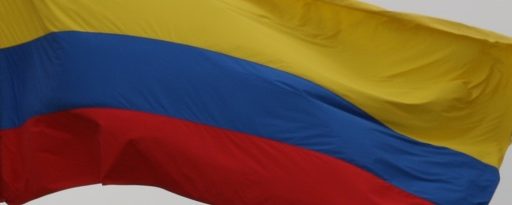

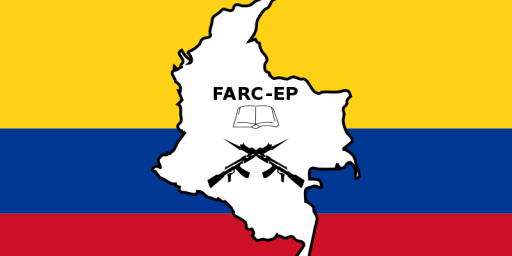
Thanks, Steven. An important foreign election that got effectively zero coverage in the U.S.A.
So what are those NYT quotes, Flat Earth Luddite?
Interesting! “His entrepreneurial view of things is comparable to Trump” would be a red flag to me. Oh well.
@Joe:
Sorry, Joe, but us broke left coast retirees can’t afford NYT. I’m limited to free/cheap news sources, but feel free to mock me. This was the first coverage I’d seen, and I appreciated it.